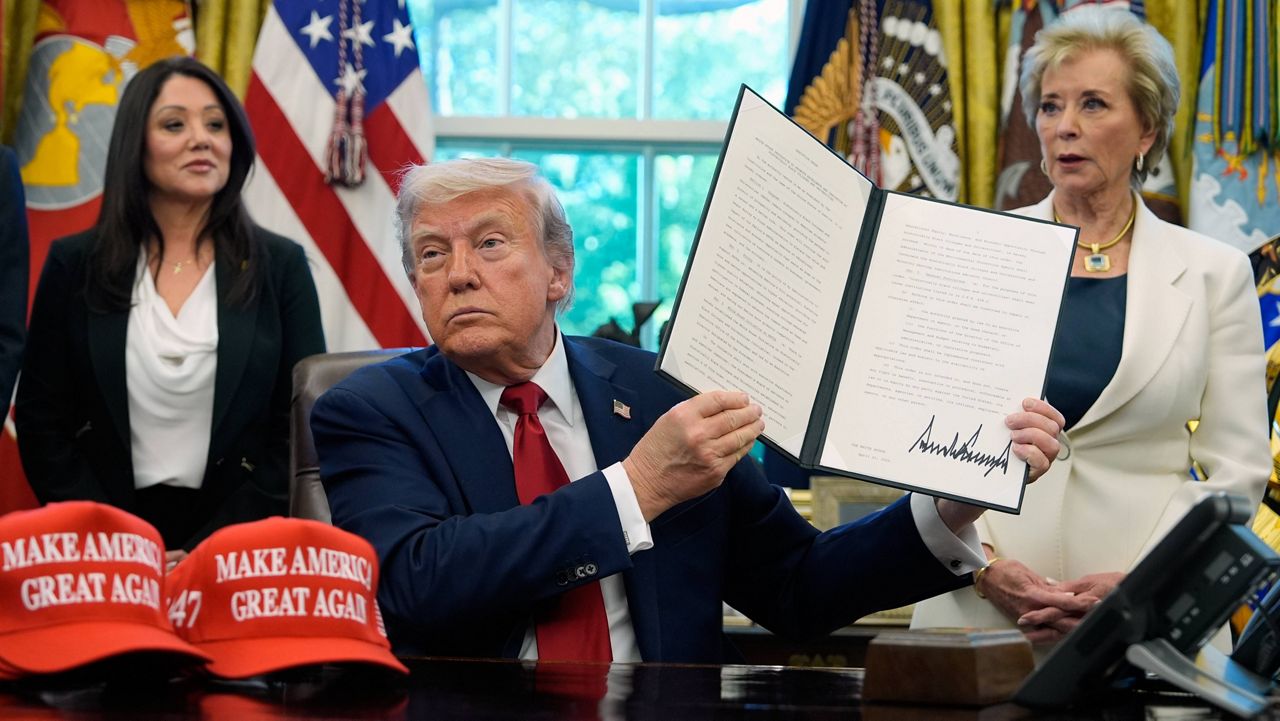President Joe Biden met again Tuesday with members of congressional leadership, including House Speaker Kevin McCarthy, R-Calif., after days of staff-level meetings to try and reach a consensus on raising the country's borrowing power.
Biden and McCarthy were joined by Vice President Kamala Harris, Senate Majority Leader Chuck Schumer, D-N.Y., Minority Leader Mitch McConnell, R-Ky., and House Democratic Leader Hakeem Jeffries, D-N.Y.
Speaker McCarthy said after the meeting that the sides are still very far apart, but added that it's "possible" they could reach a deal by the end of the week.
"We've got a lot of work to do in a short amount of time," McCarthy said, adding: "It’s not that difficult to get to an agreement."
But, the California Republican offered, "it is possible to get a deal by the end of the week."
McCarthy added that the scope of the talks will now narrow, between the speaker and the president.
"The president changed the scope of who's now negotiating," he said. "The structure of how we negotiate has improved."
McConnell said that the president and his House GOP counterpart "are the keys to the deal."
The White House described the meeting as "productive and direct."
"The President emphasized that while more work remains on a range of difficult issues, he’s optimistic that there is a path to a responsible, bipartisan budget agreement if both sides negotiate in good faith and recognize that neither side will get everything it wants," the White House said in a statement. "The President directed staff to continue to meet daily on outstanding issues. He said that he would like to check in with leaders later this week by phone, and meet with them upon his return from overseas."
At an event later Tuesday marking Jewish American Heritage Month, Biden characterized the meeting as "good" and "productive."
"There is still work to do," Biden said. "But I made it clear to the speaker and others that we'll speak regularly over the next several days and the staff's gonna continue meeting daily to make sure we do not default."
"I'm confident we're going to continue to make progress toward avoiding default," Biden continued, adding that he believes there was an "overwhelming consensus" in Tuesday's meeting "that defaulting on the debt is simply not an option."
"Our economy would fall into recession," Biden warned. "It would devastate retirement accounts, increase borrowing costs, and according to Moody's, nearly 8 million Americans lose their jobs, and our international reputation would be damaged in the extreme if we let that happen."
"It's disappointing that our discussions in the congressional Republicans have not been willing to discuss raising revenues, but policy differences between the parties should not stop Congress from avoiding default," Biden continued. "I made clear again in today's meeting that default is not an option. America pays its debts, pays its bills, and there will be plenty of time to debate the policy differences."
"We've never defaulted on our debt and we never will," he added.
The meeting came one day after Treasury Secretary Janet Yellen warned in a letter to congressional leaders on that the United States is still on track to default on its obligations "as early as June 1" unless lawmakers take action to raise the debt limit.
"Yesterday, I told Congress that we still estimate that Treasury will likely no longer be able to satisfy all of the government’s obligations if Congress has not acted to address the debt limit by early June – and potentially as early as June 1," Yellen said of Monday's letter in a speech to community bankers on Tuesday. "It is impossible to predict with certainty the exact date when Treasury will be unable to pay all of the government’s bills, and I will provide an additional update to Congress next week as more information becomes available."
"Nonetheless, our current best estimate underscores the urgency of this moment: it is essential that Congress act as soon as possible," she continued. "In my assessment – and that of economists across the board – a U.S. default would generate an economic and financial catastrophe. Over the past few years, American families and businesses – including many of yours – have worked hard to mount a historic economic recovery. A default would reverse all of the hard-earned progress that we’ve made, and it would set us back even further."
The Treasury chief's warning is in line with past estimates for what experts call the "x-date," the day when the department's "extraordinary measures" employed to stave off default will run out.
Yellen's latest warning came just days after the nonpartisan Congressional Budget Office warned of "significant risk" that the U.S. could default "at some point in the first two weeks of June."
House Republicans have been in a contentious standoff with the White House and Senate Democrats over addressing the debt limit. The Republicans are demanding steep spending cuts in exchange for raising the country's borrowing power, while Democrats say it should be lifted with no strings attached, as it was three times under Biden's predecessor, former President Donald Trump.
The meeting between the White House and congressional leaders was set for Friday, but was postponed as staff-level negotiations continued.
Senate Majority Leader Chuck Schumer, D-N.Y., said Tuesday morning ahead of the meeting that talks on budget cuts and raising the debt limit are taking place "separately but simultaneously."
"Democrats will not use the threat of default to get what we want," Schumer said on the Senate floor, adding: "Nobody should say, ‘Unless do you this, then we default,’ because the consequences will be devastating for America."
McCarthy told reporters Tuesday that work requirements for social safety net programs are a so-called "red line" in any negotiations on raising the debt limit, a possible point of contention with House Democrats.
"What work requirements actually do, help people get a job," McCarthy told reporters Tuesday. "Every every data point shows that, and it helps people move forward. So the public wants it. Both parties want it. The idea that they want to put us into a default because they will not work with [us] on that is ludicrous to me."
"This is something that President Biden as senator voted for. This is something that President Bill Clinton signed," he added.
McCarthy warned that they would need to reach a deal by "this weekend" in order to be able to get a bill passed by both the House and Senate ahead of the default deadline. President Biden was set to travel to Japan later this week for a Group of 7 summit.
"All I know is we've got 16 more days to go," McCarthy said Tuesday of Biden's trip. "I don't think I would spend eight days somewhere out of the country.”
Biden later cancelled additional scheduled travel to Papua, New Guinea, and Australia in order to focus on the negotiations.
Yellen similarly warned that time is of the essence, noting that waiting until the last minute "can cause serious harm to business and consumer confidence, raise short-term borrowing costs for taxpayers, and negatively impact the credit rating of the United States."
"If Congress fails to increase the debt limit, it would cause severe hardship to American families, harm our global leadership position, and raise questions about our ability to defend our national security interests," she added.
For Biden, the standoff may have echoes of 2011, when then-President Barack Obama struck a deal with Republicans just two days before the U.S. was estimated to default. While an economic disaster was averted that time, it was not without consequences, notably the country's credit rating being downgraded for the first time in its history.
"One of the lessons from 2011 is don't do a high-wire act," White House senior adviser Gene Sperling, who served as Obama's National Economic Council director at the time, told Spectrum News. "What happened in 2011 was we literally got down to midnight."
"What we saw was that by going to the wire, we saw interest rate costs go up," Sperling continued. "We saw consumer confidence go down. We saw the stock market plummet. We were downgraded for the first time in our history, and people later estimated that over a million jobs were lost in that year due to the uncertainty that was created."
In 2011, President Obama agreed to spending cuts over 10 years and the formation of a joint congressional committee to study long-term debt reduction.
When asked why Biden hasn't acquiesced to McCarthy's demands, Sperling said that it would be "terrible for American democracy" if the president gives in to threats to default on the country's debts.
"If we have any situation in our country where one side, one-third of the government can say, we can put out an extreme budget that would not have the support of both houses or the president, but the other side has to concede because we're threatening to put the country into recession and cost millions of jobs unless we get our way, that would not only be terrible for our economy now, that would be terrible for American democracy," Sperling said. "No one should do that."
Sperling reiterated that President Biden has said that he will "sit down and do a good faith negotiation on what our future spending should be, what our future fiscal path should be," but noted that default must be off the table in any negotiation.
Sperling echoed the president's optimism on the state of the negotiations.
"Whatever the political statements are, the fact is: we are talking, there is some constructive, positive things happening," Sperling said, adding: "But I also agree, there's some deep divisions, and we still have a long ways to go."
With just four days left with the House and Senate both in session, the pressure is mounting to reach an agreement.
"Already, we're starting to see some lower numbers in terms of consumer confidence in some of the surveys that are going on," said Todd Belt, Director of Political Management at George Washington University. "You'll see a little bit of an economic slowdown if this does happen, and that's something that they very much want to not happen."
But, Belt said, negotiations could come down to the wire again.
"Negotiations almost always come down to the end," he said. "They're usually not done early, and the reason for that is both sides think they have leverage. If they didn't think they had leverage, they would have brokered a deal a long time ago, and they're going to try to get as much as they can."
"Speaker McCarthy wants to be able to go back to his conference and be able to tell them I worked until the very end and got as much as I could out of the Biden administration," he added.






_crop)


